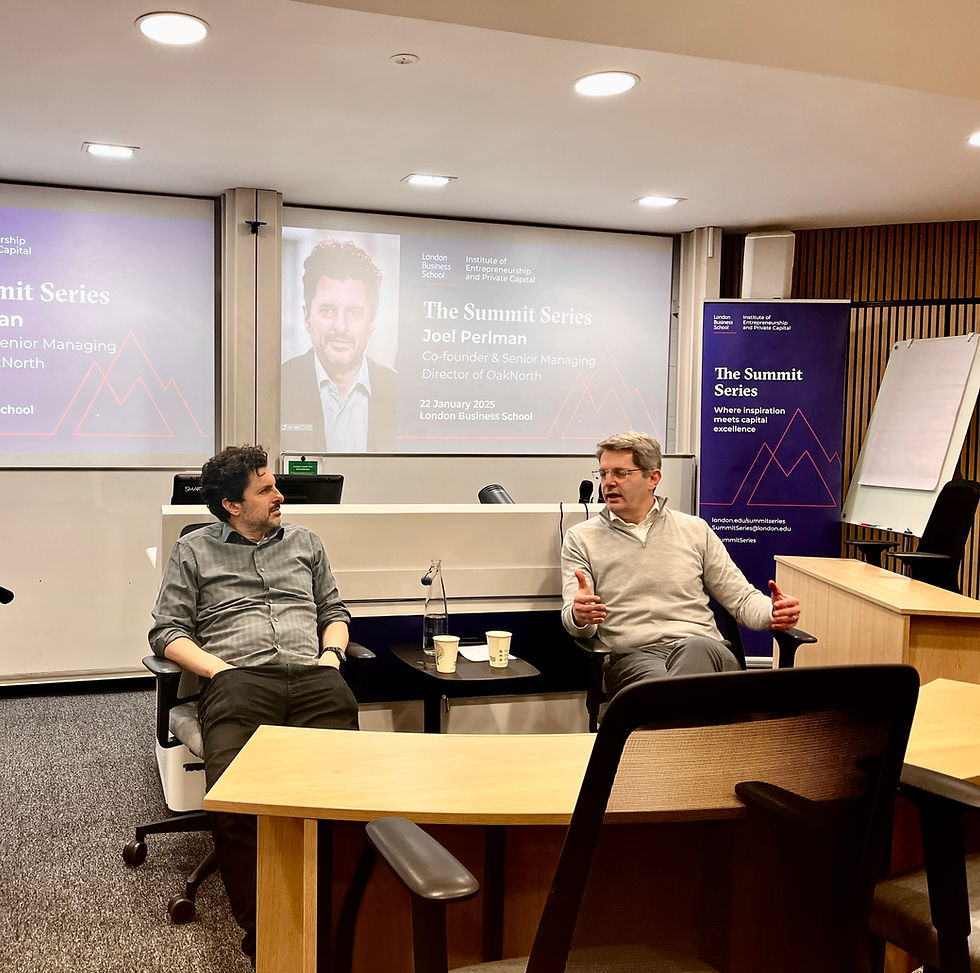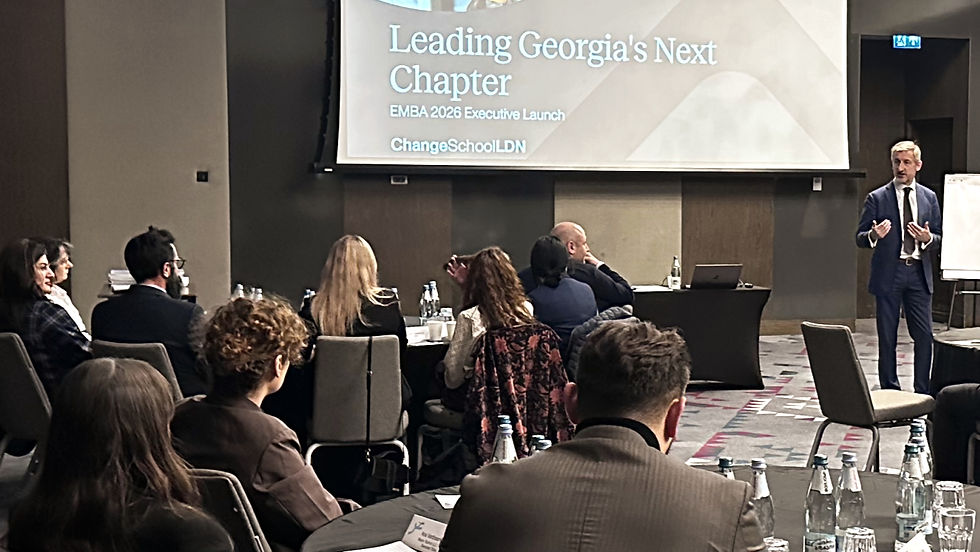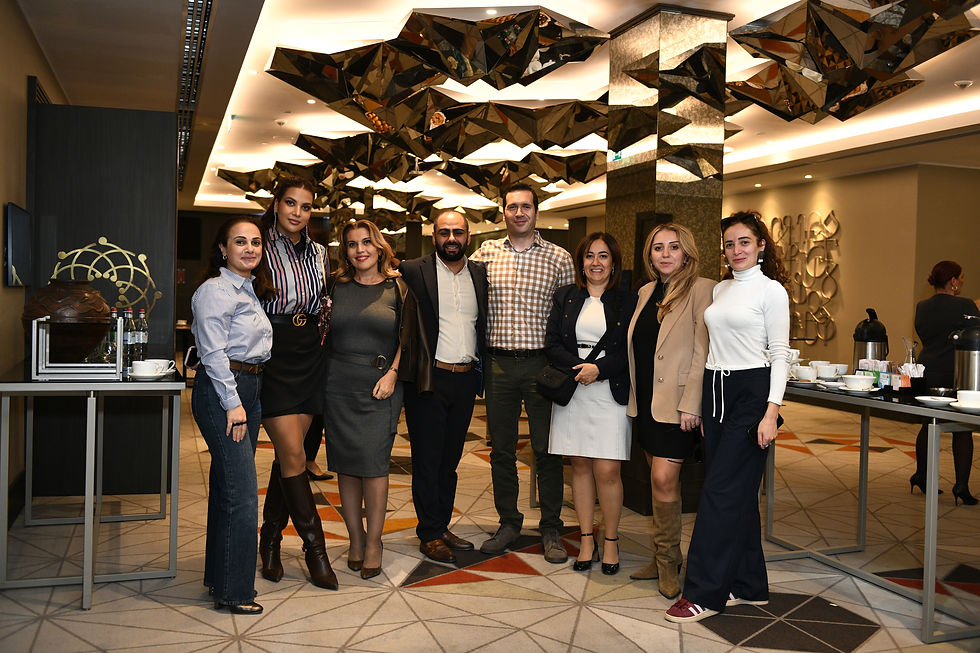How to Successfully Balance Growth, Identify Market Opportunities, and Manage Risk: Key Lessons
- Feb 5, 2025
- 4 min read
Updated: Jun 18, 2025
The entrepreneurial journey of Joel Perlman, Co-founder, Oaknorth, UK's leading bank for SMEs
In January 2025, ChangeSchool Managing Director Viren Lall, had the opportunity to listen to Joel Perlman, Co-founder and Senior Managing Director of Oaknorth, at the London Business School Summit Series talk by entrepreneurs. Joel is a prime example of what persistence, innovation, and calculated decision-making can achieve in today’s dynamic financial landscape. From co-founding Copal Partners in 2002 with just $60,000 to building Oaknorth into a £5 billion-valued fintech bank, his journey offers valuable insights into scaling businesses while balancing risk and profitability.
1. Balancing Growth and Profitability: A Delicate Art
Joel’s experience underscores the critical balance between growth and profitability. Early in the journey of Oaknorth, the initial focus was on growth to establish a market presence, attract investors, and secure customer confidence. However, unlike the growth-at-all-costs approach many startups adopted, Oaknorth deliberately focused immediately on profitability once the foundation was laid (within 11 months).
Why is this balance so important? Profitability gives businesses staying power—ensuring they are not at the mercy of external investors or unpredictable markets. Venture capitalists (VCs) tend to prioritise growth, often pushing startups to achieve massive scale, betting on “unicorn” outcomes. But this strategy is a double-edged sword. As Joel shared, when the “music stops,” startups often find themselves unable to secure additional funding, leaving founders at risk of losing equity or control.
By carefully managing this balance, Oaknorth was able to secure substantial funding from prominent investors like SoftBank Vision Fund while still maintaining control over its long-term trajectory. He said, entrepreneurs, should not blindly pursue VC-driven growth. Instead, they should focus on sustainable progress and aim for what he calls a “2% unicorn”—businesses with solid valuations, sustainable growth, and the ability to generate returns without chasing moonshot outcomes.

2. Identifying Market Opportunities Through Unique Insights
One of Oaknorth’s defining moves was its ability to identify a market opportunity many traditional banks had overlooked. The inspiration behind Oaknorth stemmed from Joel'sand co-founder Rishi Khosla’s experience raising capital during their Copal Partners days. When seeking funding, they encountered a stark difference: in London, they were offered $300,000 secured against personal assets, while in New York, they were offered $10 million unsecured for the same pitch. This disparity highlighted the mispricing of risk and the conservative lending practices prevalent in the UK, especially for small and medium-sized enterprises (SMEs).
In the UK, the top four banks controlled 80% of the market, leaving SMEs underserved and struggling to access credit. Oaknorth recognised this gap and positioned itself as the go-to lender for SMEs—a niche but substantial market. Unlike many fintech firms focusing on the consumer (B2C) market, Oaknorth deliberately targeted the business (B2B) segment, avoiding the high customer acquisition costs associated with retail banking.
The key lesson here is that identifying a market opportunity often requires founders to look beyond obvious trends and ask: “What isn’t being served?” For Oaknorth, that meant providing tailored lending solutions for SMEs and building a competitive moat through its technology-driven credit assessment platform. This strategic insight has been critical to its growth, enabling the bank to lend £13.2 billion and generate £200 million in profit as of 2024.
3. Understanding Risk and Avoiding Success Bias
One of the most compelling insights from Joel’s journey is managing risk and avoiding the lure of success bias. Many entrepreneurs use outlier success stories like Amazon or Tesla as blueprints for their ventures, failing to account for the hidden risks and challenges underpinning such journeys. Perlman highlights the dangers of this mindset, likening it to “walking blindfolded on the M25 and not expecting to get hit.”
Entrepreneurs often see the rewards of success without understanding the risks taken to achieve them. Risk, Joel explained, is hidden, and focusing solely on return without accounting for risk-adjusted performance can lead to disastrous outcomes. For example, while Oaknorth’s rapid growth is impressive, it was underpinned by careful risk management and strategic planning, such as securing a valuable banking licence in 2015 and adopting a disciplined lending approach.
His emphasis on risk-adjusted decision-making is reflected in Oaknorth’s use of AI-driven models to assess credit risk more effectively. By leveraging technology, Oaknorth can make more accurate lending decisions, maintaining profitability while scaling its lending operations. This approach protects the bank from potential losses and ensures sustainable growth—demonstrating that responsible risk management is a key pillar of long-term success.
Conclusion: Lessons for Entrepreneurs
Joel Perlman’s journey offers several key takeaways for entrepreneurs:
Balance growth and profitability: Chasing rapid growth without a path to profitability can leave businesses vulnerable. Sustainable growth, backed by profitability, ensures long-term survival and independence from external pressures.
Identify market opportunities through insights: Explore underserved niches beyond the obvious. Oaknorth’s success in SME lending shows the value of solving specific problems with tailored solutions. It was not about market share or dominance but focussing on a big enough market (Target Addressable Market)
Manage risk and avoid success bias: Success stories are inspiring but misleading if risks are overlooked. Entrepreneurs should focus on risk-adjusted returns and make informed decisions based on probability, not anecdotal success.
Background: Joel Perlman, the Co-founder and Senior Managing Director of Oaknorth, has had an inspiring entrepreneurial journey marked by perseverance and innovation. Born and raised in Bogota, Colombia, he overcame early challenges to earn degrees from Georgetown University and the London School of Economics. In 2002, Perlman co-founded Copal Partners with Rishi Khosla, starting with just $60,000. Together, they grew the financial research company into a 3,000-employee organisation operating across 13 markets before selling it to Moody’s Corporation in 2014. Building on this success, the duo launched Oaknorth in 2015, a fintech bank dedicated to providing loans and banking services to small and medium-sized enterprises. Under their leadership, Oaknorth has flourished, achieving a valuation of $5 billion.
ChangeSchool has worked across 39 countries, supporting over 4,700 entrepreneurs and leaders. We have delivered multiple editions of the Leaders in Innovation Fellowships (LIF) for the UK’s Royal Academy of Engineering. We are currently leading the training and coaching for Enterprise Hub accelerators, one of Europe’s top 10 accelerators. Key collaborations include leading the UK Government-funded Innovation for African Universities (IAU) programme, reaching over 11,900 beneficiaries and creating 139 businesses, as well as working with the engineering and medical faculties of King’s College London and UCL to commercialise their innovations. See our Entrepreneurship Education services here



